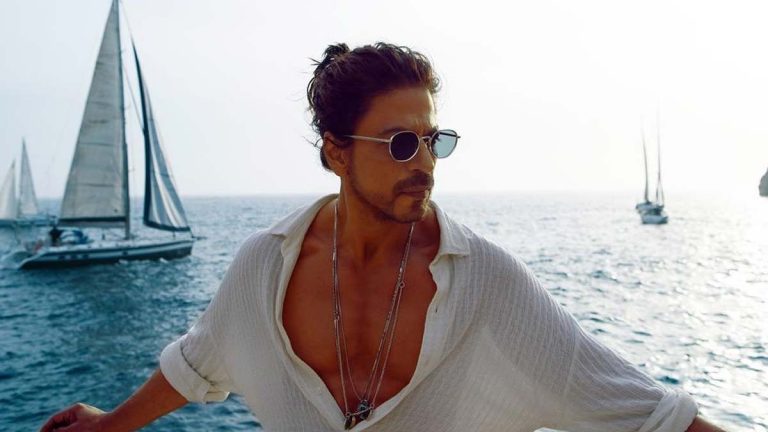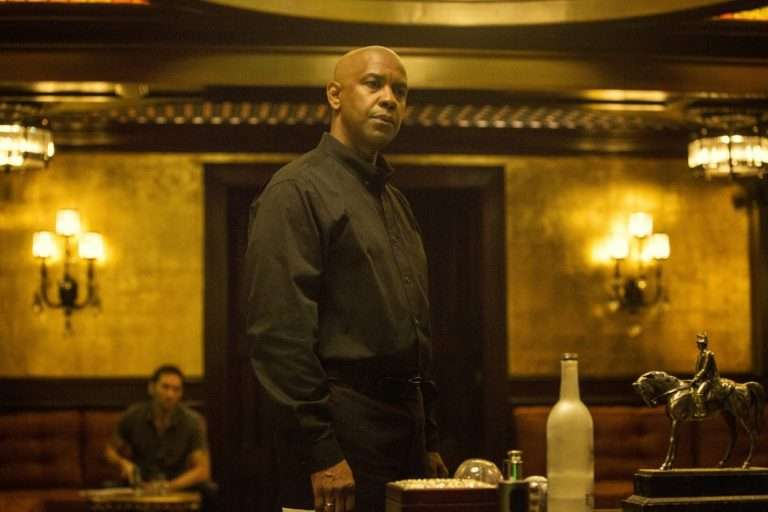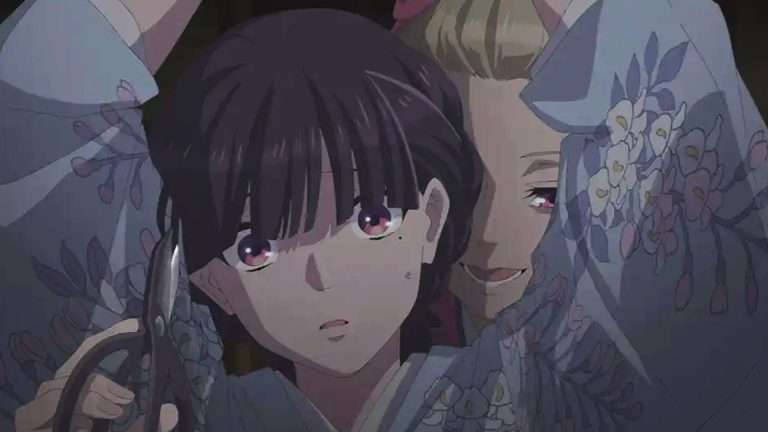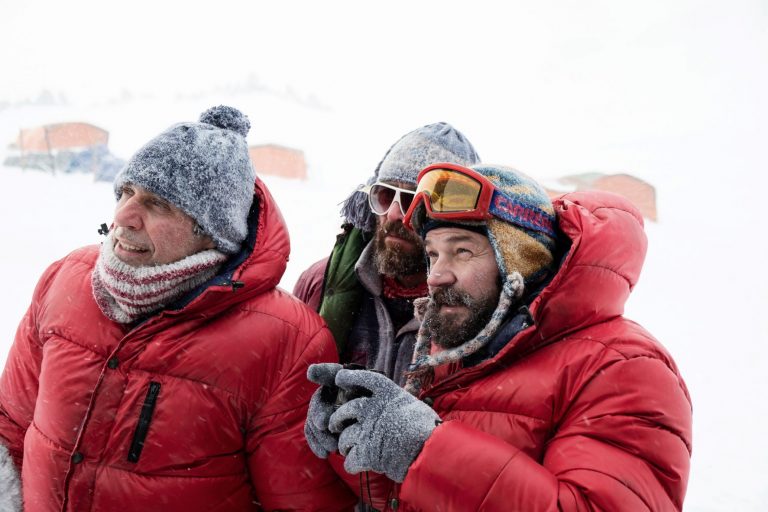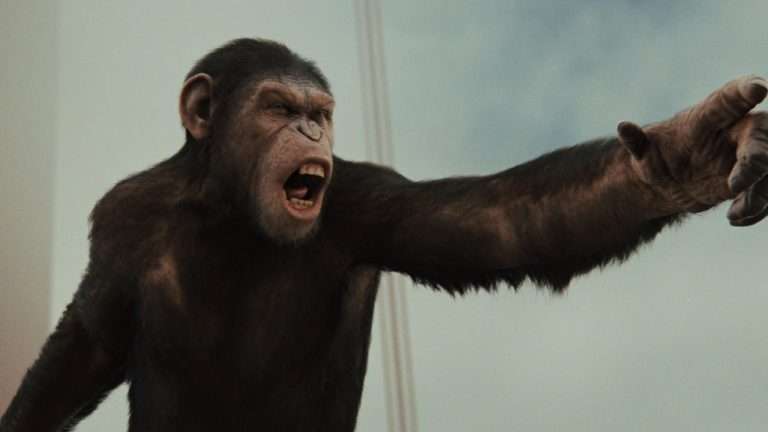To the uninitiated (that would include me as well), Karl Lagerfeld was a German fashion designer who began his career in fashion, working for top fashion houses like Balmain, Patou, and Chloe before attaining international acclaim after becoming artistic director for Chanel in 1983. “Becoming Karl Lagerfeld,” conceptualized by Isaune Pasani Ferry, Jennifer Have, and Raphaelle Bacque, covers Lagerfeld’s rise in the 1970s Parisian fashion circle just before he joined Chanel. It also extensively covers his tumultuous relationship with Parisian socialite Jacques De Bascher and his dynamics with professional rivals Yves Saint Laurent and Laurent’s business partner Pierre Berge.
Becoming Karl Lagerfeld (Miniseries) Recap:
Episode 1 – The Mercenary of prêt-à-porter
In Paris in the spring of 1972, Karl Lagerfeld (Daniel Bruhl) was not yet the iconic designer he would become. At 38, he advertised himself as 5 years younger to the general public and the Parisian fashion circle. Lagerfeld is a ready-to-wear designer for the fashion house of Chloe, backed by co-founder Gabrielle Aghon (Agnes Jaoui). When the episode opens, however, we see him as a freelancer, a “ready-to-hire” mercenary, as his mother pseudo-mockingly spells out to him. But he has ambitions for his brand and, more importantly, a life he wants to have, similar to one shared by his professional rival, Yves Saint Laurent (Arnaud Valois).
Taking the invitation for the 10th anniversary of Saint-Laurent House as a personal affront, as it isn’t monogrammed, Lagerfeld decides to forego the freelance fashion designing route, whereby he would pitch his designs to other houses like the Fendi sisters. While discussing with Aghon, he remarks that having both Lagerfeld and Jean-Jacques Bartelli as part of Chloe’s stable would dismantle the chance for Chloe to have a personalized style of its own, which could only be rectified by Aghon hiring Lagerfeld as Chloe’s art director, which Lagerfeld, albeit reluctantly, acquiesces to.
Meanwhile, on the personal front, Parisian socialite Jacques De Bascher (Theodore Pellerin), openly gay and proudly so, goes to a famously queer nightclub, where he is akin to being “hit by the thunderbolt” when he first lays eye on Lagerfeld. Unable to garner his attention a second time, Bascher researches Lagerfeld and finally decides to write a letter to Lagerfeld, urging him to meet for a late-night rendezvous at a small club out in the cobbled lanes of Paris—a nightclub populated by “a bunch of rich old men and their twinks.” As Lagerfeld explains to Bescher, he doesn’t indulge in the traditional vices of drugs and alcohol and only chooses to meet Bascher because of the letter and his curiosity.
Meanwhile, Bascher opens the long overcoat he had been wearing, revealing only lederhosen underneath, but as he reveals, the method of seduction wouldn’t work on Lagerfeld because it feels like Lagerfeld is more interested in having Bascher join his flock of muses. As it turns out, what connects them are their shared dreams of being greater than their circumstances and their shared love for literature, though Bascher is more open to extravagance than Lagerfeld. This first meeting leaves an impression on Lagerfeld because he invites Bascher to the home he shares with his mother, Elizabeth (Lisa Kreuzer), to dress him for acting as his plus one at the Yves-Laurent anniversary party.
At the party, Bascher, as well as the audience, meet the prime supporting players of the story, introduced by Lagerfeld: Paloma Picasso, Anna Marie Munoz, and Pierre Berge, the secretary and business partner of Yves Saint Laurent, respectively. Munoz, Laurent, and Lagerfeld started together; thus, she is one of the few real friends that Lagerfeld has in the business. Berge, on the other hand, has an intense dislike for Lagerfeld, and even Lagerfeld admits that Berge would be the reason why he and Yves had separated. And while the fashion show coinciding with the anniversary of Saint-Laurent would be boring for Bascher, Lagerfeld is intensely checking out his competition.
As he remarks, which the real Lagerfeld famously voiced out as well, “Fashion has nothing to do with women. If it had, there wouldn’t be so many gays in the business.” But Lagerfeld is very impressed with Saint-Laurent’s talent, and as the two meet after a very long time, we learn that Laurent, too, values Lagerfeld’s friendship, crediting those memories for aiding him in climbing out of panic attacks. But the first cracks of their friendship begin to form when Lagerfeld introduces Bascher to Laurent, and we see a palpable chemistry between both Bascher and Laurent, which doesn’t go unnoticed by Lagerfeld.
However, Lagerfeld, too, is a creature of his habits. His intense work ethic, coupled with a bout of inspiration from Laurent’s own line, urges him to get to work, foregoing the night of pleasure that Bascher had expected. Two months later, on the opening of Lagerfeld’s new line, courtesy of Chloe, Lagerfeld will ultimately contact Bascher. Bascher convinces two sex workers to work in place of the models that went missing that day.
Impressed by his resourcefulness and his ease in sliding into conversations with the haughty French society, Lagerfeld instructs him to sit at the front of the walkway and keep a watch on Francine Crescent to ascertain whether she is impressed by the fashion line enough to write about it in her magazine. While that ultimately fails, Lagerfeld and Bascher do start to get closer, even as Lagerfeld realizes the beginnings of an illicit relationship between Laurent and Bascher as well.
Episode 2 – Do You have a style?
The autumn of 1973 begins with Karl Lagerfeld receiving a telephone call from erstwhile German actress and icon Marlene Dietrich, expressing interest in visiting him, whom Lagerfeld, a fellow German, regards as having the highest of honors. He then, accompanied by Bascher, goes to the first meeting of the Trade Association, consisting of the four houses of Haute Couture (Saint Laurent, Christian Dior, Ungaro, and Nina Ricci) as well as the four ready-to-wear labels (Kenzo, Emmanuel Kanhn, Sonia Rykiel, and Chloe), of which Lagerfeld would represent Chloe.
The idea, according to the publicity line espoused by Pierre Berge as the leader of the association representing Saint Laurent, is to combine tradition with the creativity of the new age, allowing them to present all their seasonal presentations in sync, thus allowing a united front against international presentations. However, as questioned by Crescent and reinforced by Lagerfeld but opposed by Berge, the association is representative of the abolishment of hierarchy, where Haute Couture would be at the top, while Ready-to-Wear is given access to both at the table and allowed to present their designs. But the dismissal by Berge sticks in Lagerfeld’s craw, which is also noticed by Crescent.
When asked later, after the meeting, about the animosity between Berge and Lagerfeld, Lagerfeld doesn’t hesitate to announce to Crescent that he will be dressing Marlene Dietrich as a Lagerfeld original. When BAscher points out that the up-and-coming German designer having a meeting of the minds with one of the best German actresses about dressing the icon in an outfit warrants an article in Vogue, Crescent laments about Dietrich’s secretive nature and how she hates journalists.
She does make a deal to devote five pages to the Lagerfeld original in exchange for an appearance by Dietrich. The trouble, though, arises when Bascher is mistaken for Lagerfeld’s assistant, which doubles down on the insecurity Bascher faces regarding Lagerfeld and his relationship. When Lagerfeld refuses to join Bascher for dinner alone, Bascher decides to have dinner with Paloma Picasso and her entourage, which coincidentally also includes Yves Saint Laurent.
Meanwhile, at Dietrich’s, the small talk hots off quite well, with their German roots sparking commonality, until she asks the million-dollar question that both reel and real Lagerfeld had to fend off—does he have a style? Unlike the previous episode’s answer, where he would respond with his style being an evolving thing, here he chooses to prove what the response ultimately entails: his style is dependent upon the muse, in this case, Dietrich. That answer seems so satisfying that she dismisses him, but before leaving, she asks whether Lagerfeld had attained the glory that had brought him to Paris when he was a wee lad of 15. Lagerfeld answers in the negative, a response that would inform his ambition and work ethic throughout the series.
However, Lagerfeld would also experience the pangs of jealousy firsthand. Invited to the Saint-Laurent house, Bascher manages to impress Yves with his friendliness as well as his flexible stance both physically and in his outlook towards life, which ultimately leads to Laurent and Bascher consummating. However, that doesn’t sit well with Bascher’s former lover and current business partner, Berge, who dismisses Bascher the next morning by offering to pay for services rendered. Later, while being fitted by Lagerfeld, Bascher is berated by him for smelling “like sex,” which Bascher takes as a hint to provoke by revealing that he had slept with Laurent before dismissing it as a joke. However, that provocation worked because Lagerfeld had visibly paled.
His jealousy, however, is alleviated by a call from Dietrich, who appreciates his ideas but wants him to design something modest for her to wear over while she accepts the Legion of Honour. He accepts the offer and is invited to come over. Lagerfeld then further works on his plan by meeting with Crescent at a restaurant. There, he offers her the Dietrich exclusive for the Vogue in exchange for allowing Dietrich to be the editor-in-chief for that issue like Fellini had been. He presents that same offer to Dietrich while fitting her, and when asked what he hopes to gain with this proposition, he recounts his ambition.
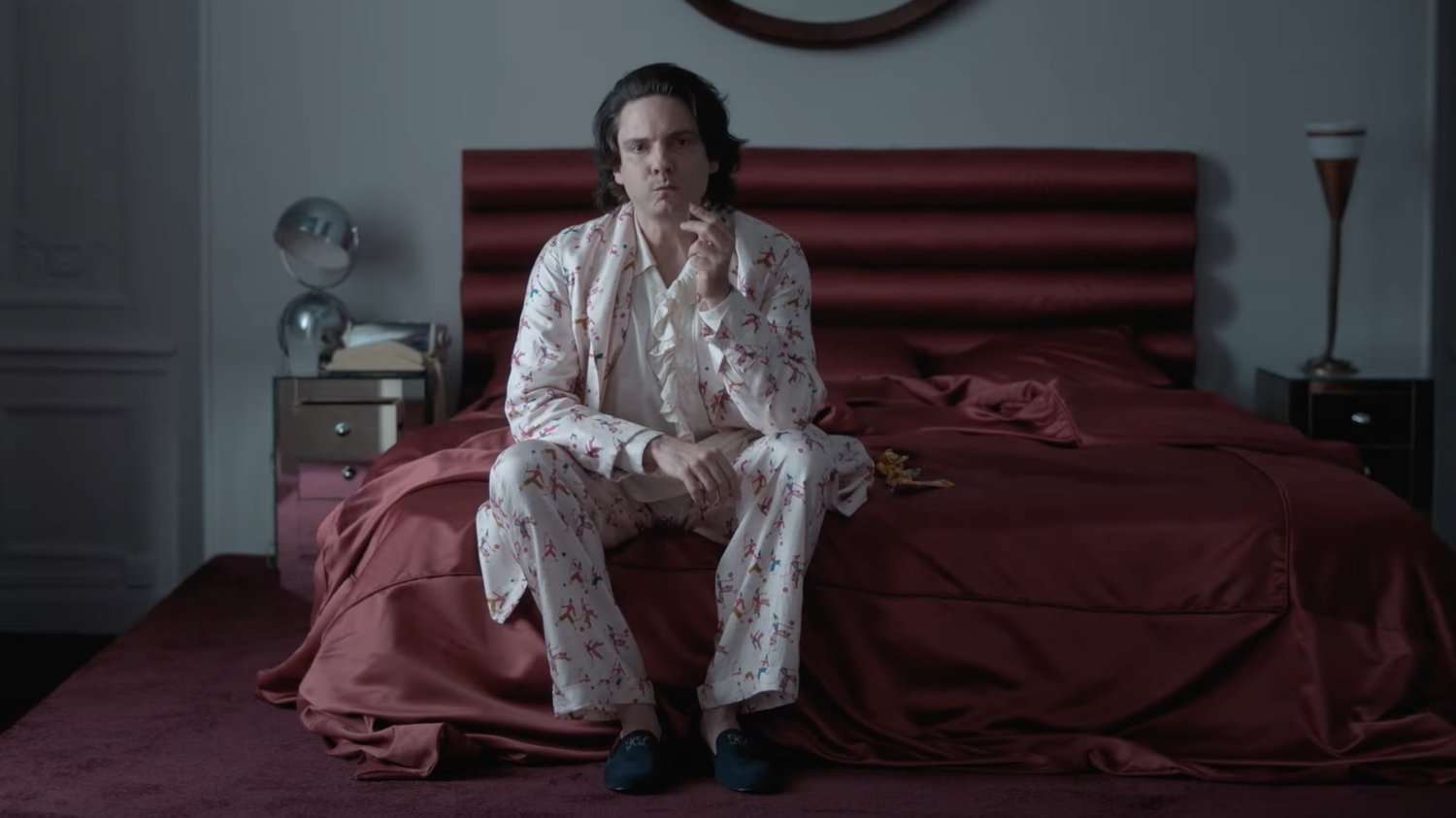
Dietrich, too, accepts, if only to give “the war child who has sacrificed his life to come to Paris a helping hand,” on the condition that she wouldn’t be dressed like a clown or as someone reliving her golden days but such that she could live out the rest of her days with her dignity intact. Considering the amount of hiding that Lagerfeld had to do—a closeted homosexual who is also extremely repressed, as well as lying about his age and his body—he shares a kinship with her.
However, the dress with panache goes overboard because when Dietrich finally witnesses the dress, he is repulsed by the bright colors, finding them too garish. She points out that Lagerfeld, to craft a Lagerfeld original, had forgotten that he would be dressing up Marlene Dietrich. She remarks that he had forgotten that the couturier should be a mirror of the woman he is dressing, and thus, the couturier only exists if the woman likes her reflection.
Bascher, meanwhile, has to fend off a possessive Yves Saint Laurent, who reappears at his apartment, adorning his staircase with flowers. And while Bascher can’t walk away from Laurent and his allure, it’s all to garner attention and a reaction from Lagerfeld. His wish gets fulfilled when, at Lagerfeld’s birthday party with a few of his friends, Laurent’s friskiness with Bascher displeases Lagerfeld visibly. Similarly to how Dietrich puts Lagerfeld in his place, Bascher, too, is advised by Berge, reminding him that he is, in the end, only a plaything “for men who work too hard.” The episode ends with both men wallowing in self-loathing, one tearing his clothes off in frustration, the other munching upon the cake left by his mother as misery threatens to cloud his wet eyes.
Episode 3 – In Bed with Karl
The autumn of 1974 is when the relationship between Lagerfeld and Bascher comes to a head. Bascher begins to enjoy a hedonistic time with Yves Saint-Laurent below the bridges when they are caught one night by the authorities. Only due to the combined might of Lagerfeld and Berge are the two of them bailed out of jail, but it finally leads to the outburst where Lagerfeld visibly voices his frustration at Bascher’s displays of rebellion.
Later, Lagerfeld would try to pacify Bascher with the promise of spending time together at a gorgeous 18th-century mansion at Pinoe. This comes after Bascher spent weeks cooped up at his apartment in a drug-induced haze. The night they escape to the Pinoe mansion, Lagerfeld and Bascher try to consummate their relationship after a stupendously wonderful dinner, and their banter slowly signals a return to normalcy, but it is all for naught in the form of Lagerfeld’s repressed sexual urges, which he deliberately tries to curtail, instead choosing to throw himself into his work and ambition, literally leaving Bascher to walk back to Paris with the rest of the servants.’
Meanwhile, Lagerfeld’s choice to ask for a bigger studio where he could design and layout is met by trepidation from Aghioni and financial sticklers from the co-founder Lenoir. Resorting to underhanded measures, Lagerfeld decides to have lunch with Bidderman, the direct competitor Chloe, whereby he proposes to work for him exclusively. Aghioni witnessed that lunch was part of Lagerfeld’s plan of aggressive negotiation, asking for a partnership, presumably a name partner.
Aghioni refuses the partnership as that would hamper her chances of career progression, and thus Lagerfeld decides to enter into preliminary talks with Bidermann, even securing a similar large venue for displaying his designs. However, when he begins to involve Bidermann in the creative process, Bidermann refuses to engage, revealing that he would want to let Lagerfeld’s genius work go unfettered. However, his vision for the company involves connecting to the American market through the introduction of a line of premium sportswear.
Disillusioned by all the events, Lagerfeld decides to blow off steam by attending a party honoring Andy Warhol’s famous painting containing four snapshots of Yves Saint Laurent. Warhol and Laurent shared a friendship dating back to 1968, with the two of them sharing a mutual admiration for each other. In that party, however, Saint Laurent would remain anything but restrained, as his possessiveness towards Bascher, who had also attended the party, takes the form of a delirium akin to a drug withdrawal, almost leading to fisticuffs between Bascher and Laurent, and finally Laurent asking “how much” to Lagerfeld with an open cheque for Bascher, breaking down in tears. Yves finally collapses from sheer exhaustion, whereby he is carried away by Berge and some of the guests. To a shocked Bascher, Lagerfeld remarks that he could only offer what he has, so Bascher could either accept that or move on.
The next morning, Lagerfeld has a meeting with Aghioni and Lenoir, where he lays out a plan to pivot, choosing to manufacture perfumes on behalf of Chloe as a way to enter the United States marketplace gingerly, testing the waters before entering through their garments. In exchange, Aghioni offers a 10-year exclusivity agreement with Chloe and no entertaining of a solo brand, which Lagerfeld reluctantly accepts. He walks out of the building to find Bascher waiting for him, having apparently accepted Lagerfeld, but while the two of them are having dinner, Lagerfeld learns that the night before, Laurent had forcefully entered Bascher’s house. When Bascher refuses his advances, the altercation leads to an eventual sexual encounter that is violent, leading to Laurent finally disappearing.
Episode 4 – Bad Reputation
The personal and the professional, which Lagerfeld had tried his hardest to keep separate, reached a boiling point in their intermingling. A rendezvous of Lagerfeld and Bascher with American interior designer Ruth Adler at the Club Sept gets dashed when Pierre chases them out of the building, even slapping Lagerfeld in the process. Lagerfeld’s anger, which he could only control by leaning into his sweet tooth, explodes in a controlled eruption whereby he dismisses Bascher, forbidding him to visit again and to go on home while Lagerfeld fixes the problem.
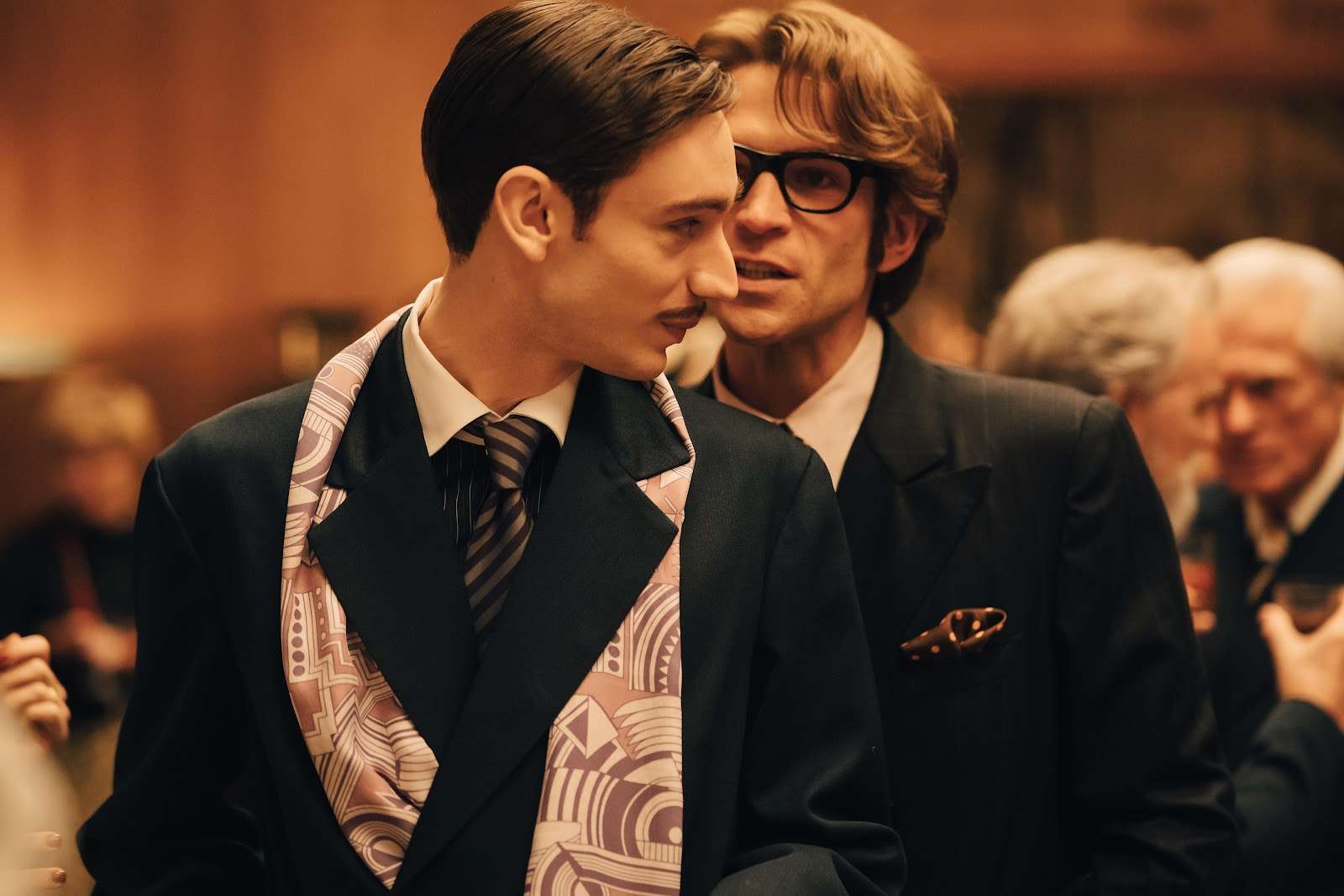
And a problem it is, because all publicists and journalists under Chloe’s lexicon were buying out of appearing at their press conference at the last minute, only urging Aghioni to settle this beef with Pierre Berge. Choosing to go straight to the source, he arranges for a clandestine meeting with Laurent’s assistant, Anna Marie Munoz, where he learns that Laurent had suffered a nervous breakdown and had to be admitted to a rehabilitation center, similar to what had occurred in 1961. Except this time, the breakdown had been worse, and Berge blames Lagerfeld and Jacques for intentionally misleading Laurent astray. Lagerfeld also learns that Berge is informing him of the truth about Lagerfeld’s heritage and the surreptitious connections he might have to Nazi Germany. It could be disproven, but Lagerfeld knew that mutterings within the Parisian circle would be enough to dent his reputation.
He thus chooses to counterattack, first through one of his models, who used to work for Paris Match magazine, by slipping in the news that Yves Saint Laurent might have passed away. The gambit works because Lagerfeld receives a call from Milan, revealing that the rumor has spread. By the end, Lagerfeld returns home to find Berge holding a press conference, having taken Laurent out of rehab as damage control, to establish the narrative moving forward. Realizing that he holds the cards, Lagerfeld calls up Munoz and informs her that he owns the love letters that Laurent had written to Bascher, which Lagerfeld had recovered from Jacques’ empty apartment, and he wouldn’t hesitate to reveal their existence to the journalists unless Berge backs off.
What Lagerfeld doesn’t reveal is the letter Bascher addressed to him, informing him that he would be returning to his parents’ home so that he could stand on his own two feet. This reaction comes after a night of binge use, which results in Bascher waking up a full day later and physically exhausting himself. But that return to his hometown doesn’t result in the rehabilitation that Bascher hoped for. As it turns out, while his mother is happy to see her son back, his father and sister noticeably aren’t. His sister is more direct in calling out Bascher’s attempts at hiding out, his pretension of belonging to a house of higher stature, and finally, how he had ignored his father for three years after their father had contracted cancer.
It’s almost as if showing a darker side to the life of the carefree dandy, and as if to push in the blade further and twist it, Anne (Jacques’ sister) presents this possibility: their father hadn’t rejected him because of his sexuality, even if that is the easiest option to warrant blame towards, but rather his propensity to choose the easy route towards life. Jacques’ searing loneliness is further reinforced by his father blatantly ignoring Jacques’ presence, though his staying for over a week went a long way towards repairing the relationship between him and his sister, as evidenced by the conversation the two of them share in Jacques’ room while listening to music.
More importantly, Anne’s perspective on homosexuality becomes the focal point of Jacques’s moving forward: that it is more than just a way of partying, being private, or dressing, but rather to live one’s own life and allow oneself to exist with theirs. More importantly, it’s political and a cause to uphold, something Anne believes would bring peace to Bascher’s life. Thus, when the episode finally ends with Lagerfeld driving up to Bascher’s place and apologizing for having acted too rashly regarding his proclivities, the minutest hesitation Jacques reveals flitting across his life is a positive sign. Perhaps a road to figure out and search for a cause of his own.
Episode 5 – The Wedding of the Century
In the spring of 1978, Karl Lagerfeld starts to make a name for himself as he shuttles through various European regions, and as he points out in an interview, he sleeps more on the plane than in bed. He is in Rome as part of the dual bridal team responsible for the wedding ceremony of Paloma Picasso. Yves Saint Laurent would be responsible for the day gown, while Lagerfeld, representing Fendi, would design her evening boudoir. But as we see, his visit to Rome is also tinged with something personal—to meet with Bascher, who is currently traveling around Rome with a group of friends.
From what we can decipher through their conversations, the two still share a mostly emotional, albeit asexual, relationship, and the two of them have enough distance to not overwhelm each other. Bascher refuses the invitation to Paloma’s reception that is occurring at Lagerfeld’s mansion, with the legitimate excuse that, unlike Lagerfeld, Bascher doesn’t have success to show to Yves and Pierre to prove that he has won. He would rather not return to Lagerfeld’s shadow, even though Lagerfeld’s incredulity is shared by the audience at Bascher cavalierly taking his money anyway.
However, Lagerfeld receives the shocking news that his mother is currently hospitalized, having suffered a cerebral stroke that leaves one side of her body paralyzed. His return to Paris marks him admirably acknowledging the professionalism of his staff at the mansion, especially Monika, who had been the first in line to contact the hospital and have her admitted, potentially saving her life. As it stands, the show must go on, and Lagerfeld keeps his stoic demeanor as he shows the reception layout to Paloma and Rafael while, in the background, planning to include Bascher in the wedding.
To that effect, he convinces Carla Fendi to hire Jacques as a videographer for an ad shoot for Fendi. Bascher feels insulted and angrily calls Lagerfeld for an explanation, pointing out that he is being effectively set up for a job without the necessary qualifications. But Lagerfeld’s controlling nature rationalizes that this would make Bascher finally pull his bootstraps and work at something to finally finish it. However, what Bascher chooses with the opportunity becomes a far more costly proposition for Lagerfeld when he later leverages the position such that ad photography becomes an artistic short film for Fendi. Lagerfeld forbids it on account of the cost involved but ultimately acquiesces, if only because it ensures Bascher will join him at the reception.
Lagerfeld manages to bring his mother back to presumably the Pinoe mansion and promises to visit her as much as he can and that she will be admitted to the best hospital immediately if it doesn’t work out. His mother reassures him and, through a garbled voice, urges him to get back out there and “show all of them.” That would be the last time Elizabeth Lagerfeld laid eyes on her son, as he would pass away four months later.
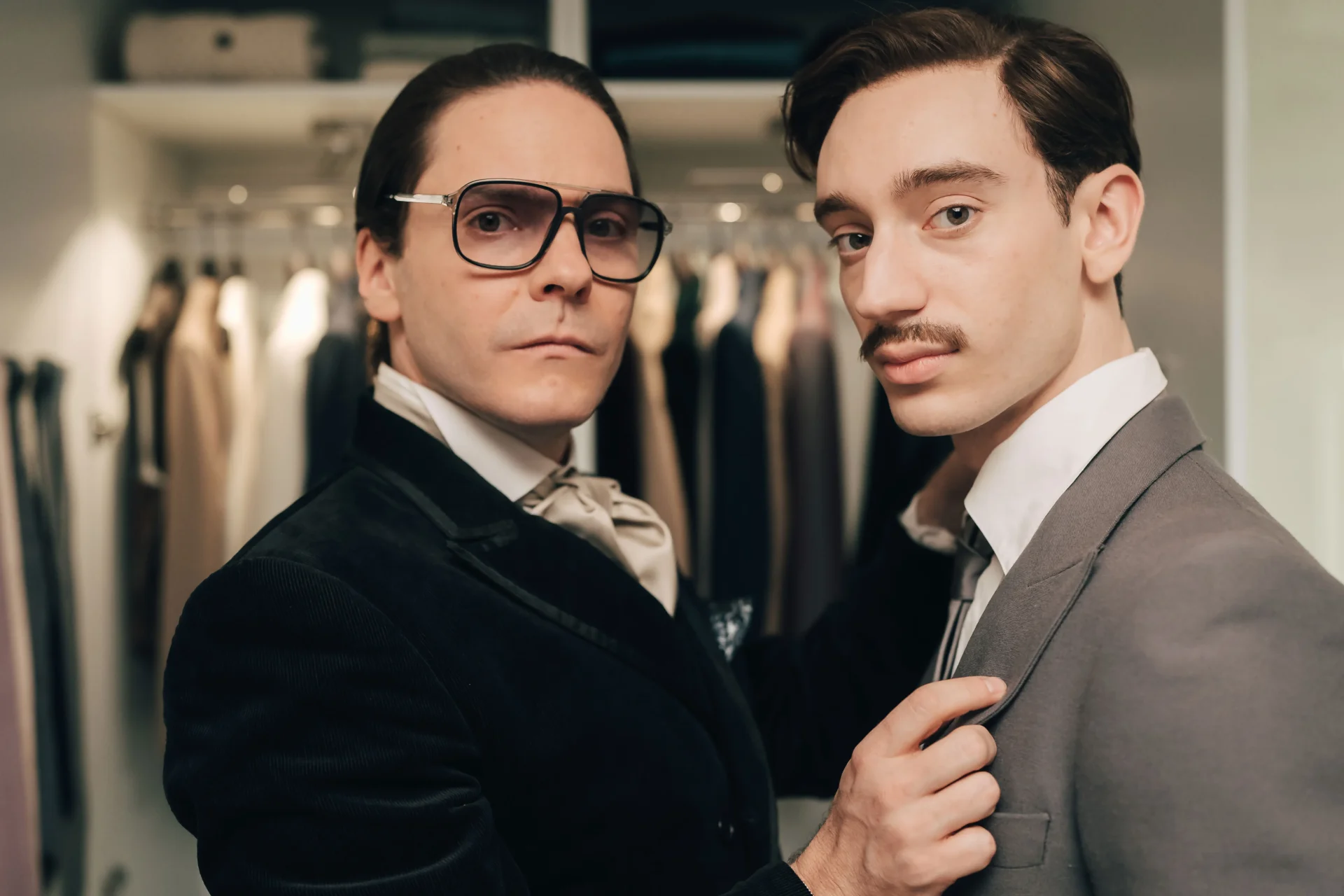
On the morning of the reception, Lagerfeld and his team enter the bridal suite for the evening gown fitting, only to learn that the morning gown fitting team is running late. As Lagerfeld waits, he comes across Saint-Laurent, whose team was responsible for the morning outfit. The two converse and softly catch up through glances and small talk, revealing and slowly healing a fractured and scarred friendship.
As we learn, Pierre left Laurent, and Laurent is still suffering from depression, but he does manage to work over it, even though he wishes to be young again. Their conversation is finally interrupted by Paloma coming out of the dressing room wearing the outfit. Lagerfeld witnesses the gown, which had been cut down to resemble a skirt. Laurent points to his shaky hand and remarks on how hard it is to draw anything. The boy genius Wunderkind has been hobbled, but the two friends are still the casualties of a bitter enmity slowly softening with time.
The guests all rush inside the large reception hall. Lagerfeld’s eyes draw only to Jacques, wearing his normal clothes but having returned, to ask Lagerfeld to dress him, and Lagerfeld, as is their routine, dutifully obliges, silently listening as Jacques regals with his experiences of finally shooting a film and the elation and frustration associated with such a project. As the reception goes on without a hitch, with Paloma’s dress, a Lagerfeld creation, being the talk of the town, Lagerfeld looks around and sees everyone conversing with each other while he is standing at the center of the room, all alone.
A searing loneliness stemming from a lack of acknowledgment even forces him to ask Jacques to stay. But Bascher, elated by the day, doesn’t pay heed to the importance of Lagerfeld asking for company and walks off to carol the night away with his friends. Lonely, dejected, and even after attaining so much success, Lagerfeld finally watches Jacques’ short film and realizes that the film is good. There is talent in Jacques, and while Lagerfeld wanted that sense of purpose to crystallize into such a thing for Jacques, he is too embittered to enjoy it.
Instead, his controlling nature takes over, and he advises Carla Fendi not to run the movie for the ad shoot, instead proposing to refund all the money. When Fendi asks whether Jacques is good and that the raw student-film quality of the short is what attracts him to the film, Lagerfeld reluctantly acknowledges Bascher’s talent. But as we witness the two of them dancing alone to the same song, one on a disco dance floor and one in his empty mansion, we witness the clear demarcation of the effect the music has on the two of them, how it depicts and exorcises out the emotions of these individuals, and how those emotions reflect the individuality of these characters.
Becoming Karl Lagerfeld Episode 6 “Monaco” Ending Explained:
How did Lagerfeld plan to introduce a new Haute Couture line?
Spring 1981 brings forth the onset of a new decade and, with it, the injection of new blood into the fashion line with the advent of Thierry Mulger and a style that could be described as a commentary on the economic crisis that is skewing away from the ethos of wearable or aesthetically pleasing. It’s the onset of rebellion, and realizing that he needs to respond, he tries to request Goughin to design a line of Haute Couture, but she staunchly refuses. To top it off, Lagerfeld also has to contend with the mood swings of Bascher as well as the group of friends staying back at his apartment every night, and when criticizing him for not taking care of them, they don’t hesitate to question him right back.
Within this tumultuous line of thought, as Lagerfeld enters Chloe’s office and tries to convince the pragmatic Lenoir of his plan, he is met by Bascher, wearing a full-length unitard resembling a pink bunny. The next scene shows the two of them conversing together, with Bascher acting as the manchild in search of a guide, clearly lost at the failure of a film (that wasn’t his fault) and in failing to finish writing a novel. Flustered, Lagerfeld finally asks what he could do to alleviate Jacques’s pain, to which Jacques expresses the desire to be taken somewhere far away, starting at zero. When the conversation ultimately tends towards nowhere, Jacques gets up to return to his comrades when Lagerfeld brings out the option of Monaco, if only to appease Jacques and remind him that he wants to take care of him.
Lagerfeld then meets with Madame Gres, the head of the house of Patou and president of Haute Couture, to propose that Chloe be co-opted as a house of Haute Couture, to which Gres strongly refuses, not only because he is German but also because she doesn’t believe that he possesses the obsession towards perfection that “a religion like Haute Couture” deserves. It doesn’t matter, as Lagerfeld points out, that out of 200 houses in Couture, the number has dwindled to 20. This would bring in new blood. Gres finally acquiesces, but only if Lagerfeld holds shows for four years, which is consistent with the recommendations given by Gres.
Did Lagerfeld side with Berge to vote Mulgerry out?
Having arranged that, there was still the matter of convincing Pierre Berge. Berge is all for supporting Lagerfeld. But that too because, with Mulgerry having been inducted into the Trade Association, Berge needs allies everywhere, and Lagerfeld believes that the youth and their rebellion signal the beginning of a shift in fashion that would wipe them all out unless they sidestep the ready-to-wear business altogether. Berge proposes that the only way to allow Haute Couture into Chloe would be to convince Mulberry and his group of young whipper snappers to come back to the table and call for a vote, in which Lagerfeld would vote against Mulberry.
Meanwhile, Lagerfeld goes to meet with Jacques Bascher at a surprise going-away party organized by his friends. Interrupting that party, Lagerfeld tries to convince Bascher, by showing the property, to go ahead alone in Monaco while he settles his affairs here. It was, of course, a lie, as Lagerfeld is more focused on getting his house in order than his love life. When Bascher begins to rebel, he tries a Hail Mary option—to adopt Bascher legally. Bascher throws a fit and shouts at his face to go away, which Lagerfeld is forced to accept. He is so distraught over his failed, rocky relationship with Karl that Bascher ends up spending the day with a young woman.
But amidst Lagerfeld’s plans to push Chloe into the stratosphere, Lagerfeld hadn’t stopped to consider consulting with Aghioni regarding her decision, which he knew she would be vehemently against. It finally leads to a fracture in their friendship, as Aghioni points out that Lagerfeld’s obsession with proving Saint-Laurent and Berge and, in totality, the entire Parisian high society wrong—a lesson hammered home by his late mother—would be tantamount to destroying the few friendships he has in that world.
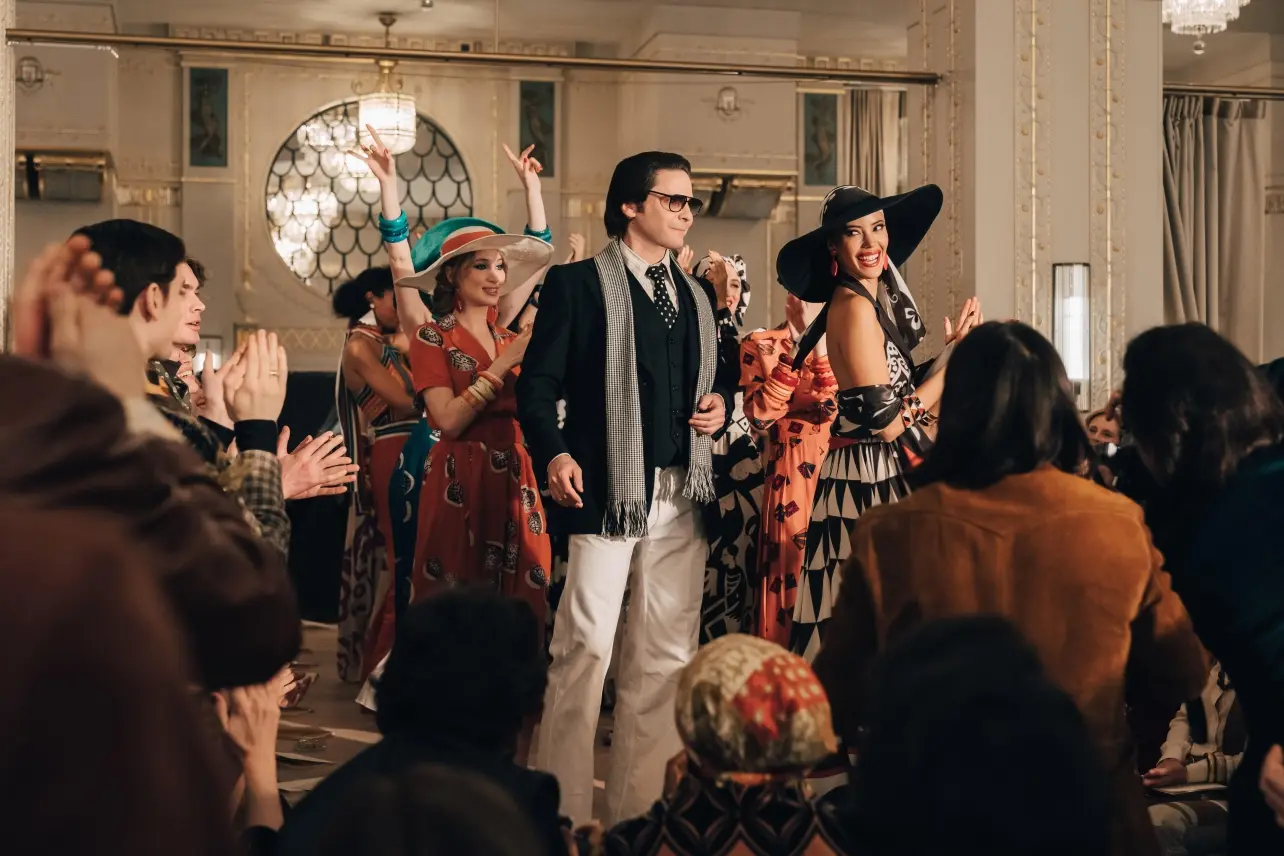
As a result, Lagerfeld is at a crossroads, and when the time comes to finally decide on the trade table, Lagerfeld instead tries to concentrate on drawing up a new design, with Bascher now becoming his new muse. As the world around him fades away while he draws, he slowly comes to a decision and, without ruminating for even a second, votes against Pierre. When Pierre asks why he is acting against his decision, Lagerfeld remarks that he knew that Berge would never have granted him the Haute Couture status to Lagerfeld and, to an extent, Chloe willingly.
Does Lagerfeld attain the glory he had desired?
As the show shifts to Monaco and winds down, we witness the strengthening and re-sealing of bonds between Lagerfeld and Bascher as they both resume their flirtatious banter, even trying to recreate their first meeting. As they hold hands and return to the mansion, he gets a call from his assistant back at Chloe. The disagreements with Aghinon had already been the subject of rumors in the entire fashion world, and now other houses are lining up with offers. As it stands, the assistant has one such offer, which she asks to fax Lagerfeld through, and she adds that if Lagerfeld accepts, she will come with him.
Lagerfeld sees the fax coming through, and he witnesses the official monogram of Chanel with a request not to entertain any other offer until Lagerfeld talks with Chanel officially. As Lagerfeld basks in glory, awaiting a new chapter to come, Bascher turns back and looks at the silhouette of Lagerfeld with concern, realizing that this relationship will forever be tested as Lagerfeld will always be a slave to his ambitions.
Becoming Karl Lagerfeld (Miniseries) Review:
Truth be told, “Becoming Lagerfeld” isn’t a show that initially held any attraction for me. As a fan of picturesque locations and bright visuals, the Gaumont-produced series splurged enough in their production to produce at least a gorgeous-looking show. It also helped that the six episodes are extremely binge-able on account of being short and compact in length.
Creators Isaune Pasani Ferry, Jennifer Have, and Raphaelle Bacque decided to take a snapshot-like approach rather than the traditional biographical approach for the Lagerfeld story while fully dramatizing conversations between historical figures in a similar manner to Peter Morgan’s “The Crown.” By choosing to focus almost squarely on Lagerfeld, the show had the risk of alienating audiences, as Lagerfeld would strategize and play mind games for one-upmanship in an attempt to provide closure to his never-ending ambition.
However, his past and the discrimination faced by him and his family within that society give him a relatable edge. As a result, the viewer roots for him to succeed, even as history is the reliable witness of that success. But that dramatization provides a very necessary bout of energy that sidesteps some of the details needed to further ground the story as well as Lagerfeld’s own designing process.
However, the creators’ primary focus is on the unconventional relationship between Lagerfeld and his dandy, Jacques Bascher. For a show supposed to depict the illicit and the scandalous, “Becoming Karl Lagerfeld” is the most seductive during those moments of eye contact between Bruhl’s Lagerfeld and Pelleronin’s Bascher. It manages to sidestep the toxic depiction of the relationship as well as the unlikeable character of Bascher, who is never really given much of an overarching character arc due to the time jumps as a consequence of the snapshot approach of the screenplay.
To ensure that the show rises above these glaring flaws, the performances bear the responsibility of carrying the show to the finish line. As Lagerfeld, Bruhl is extraordinary, able to impart extraordinary humanity, lending empathy to a character that, on paper, is downright unlikeable and a control freak. Bruhl’s performance sidesteps the necessity of the backstory, giving an air of heavy melancholia and pitting him as the eternally capable underdog against the cold, cruel bourgeoise of the fashion world of the 1970s.
It smartly provides the illusion of depth for a show that, by design, wouldn’t allow for much depth beyond the limitations of the episode, as the timeline never progresses continuously. Theodore Pellerin delivers a similarly charismatic performance, providing Jacques Bascher with vulnerability and a childlike enthusiasm that almost underscores an air of tragedy within the character, giving rise to conflicting emotions within the viewer.
By choosing to focus on the character and casting gifted actors in all the roles, even the bit parts, “Becoming Karl Lagerfeld” becomes more than a superficial collage of snapshots in the life of a complex historical figure. It instead gives the impression of a vast tapestry, in the world of high fashion and tight-wire acts of subterfuge and pleasantries, and yet that world is adorned with characters with as many fallacies and vulnerabilities. Albeit flawed, it is nonetheless fascinating.




